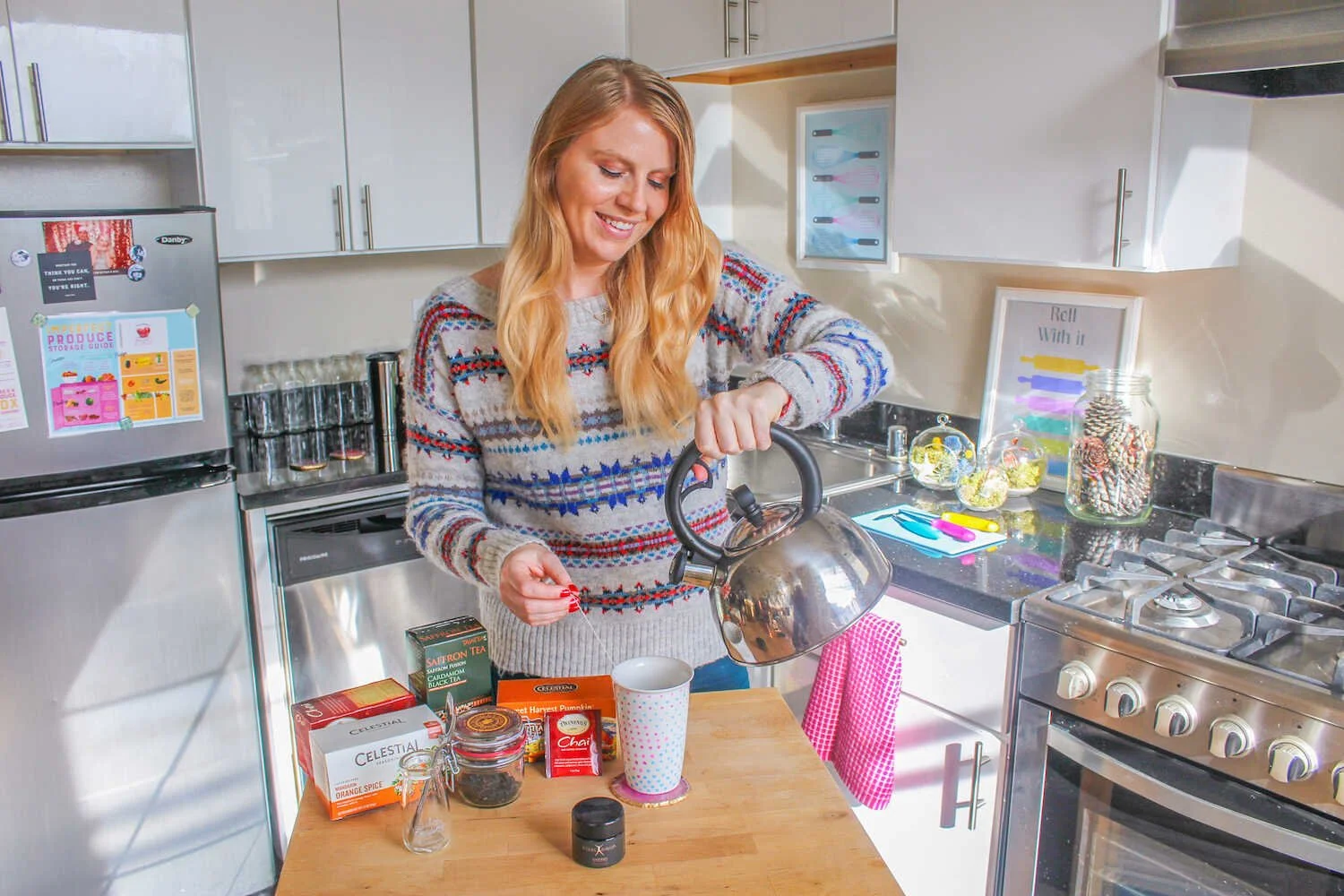Buy a House in a Year - A Complete Checklist to Buying Your First Home
For years my husband and I were paying high rent costs for our tiny apartment in San Francisco. All the photos in this blog post were taken during our last year of renting. While we loved living in the city, we knew eventually we would be moving into the suburbs to buy a house and start a family.
One day we received a letter from our landlord that our rent would be going up again, and this was the kick in the pants we needed to lay out the groundwork to homeownership. This notice was the straw that broke the camel’s back and we made the decision to get serious about buying a house and putting a permanent end to paying rent.
About this Homeowner Guide
This guide compiles all the research and steps we followed in the process of buying our first house. It took us about a year to complete all these stages in our journey, not to mention saving up for the downpayment. It’s never too early or too late to begin your own plan of action towards owning your first home. My advice is to take it one step at a time and give yourself a reasonable amount of time to complete all the steps.
When you’re looking to make the jump from renting to purchasing your first home, you’ll want to be armed with all the necessary knowledge and information before getting started. Putting down roots in a certain community or area typically signifies an exciting new chapter in life. Whatever the case may be, this can be an incredibly daunting process to take on; with this guide, and the help of a knowledgeable real estate agent, you’ll be signing the closing documents for your new home in no time.
If you're looking for a complete checklist to guide you through buying your first home, click for more information and start your journey with confidence.
Review Your Financial Situation
The first step in home buying is making sure you’re in the right financial position to take on this major purchase. Being a homeowner comes with unique challenges, so make sure you anticipate each expense on top of monthly mortgage payments. You’ll no longer have a landlord to make regular repairs and maintenance so that responsibility will fall into your lap.
Moreover, it might be a good idea to find a good tax calculator so tax time isn't as hectic. That goes for those that receive a tax refund, as well as those that might end up owing taxes. It’s also important to make sure that you manage your money well, have established a strong credit score, are maintaining a stable career, and can commit to staying in one place.
Additionally, when navigating real estate transactions, it's crucial to consider real estate transfer taxes. These taxes are imposed by state or local governments on the transfer of real property and can vary significantly depending on location and property value. To accurately estimate these taxes and ensure a smoother tax season, utilizing a reliable tax calculator can be invaluable.
Saving Up for a Down Payment
Perhaps the most jarring cost that comes with buying a home is the down payment. This is the money that you have to put down upfront, which will affect your payment plan and can also show lenders that you’re a reliable borrower. Traditionally, many people believe that 20% (of the total home cost) is the rule of thumb for down payments. Hitting this threshold will be beneficial, as it will mean you won’t have to get PMI or private mortgage insurance. Generally, the more money you contribute here, the lower your monthly payments will be. Though, in this day and age, many first-time home buyers will put down an average of 7% for their down payment!
Keep reading below to see how we saved up for our downpayment.
Cleaning Up Your Credit
Being in a strong financial position with savings, budgeting habits, and consistent debt payments will make all the difference when a lender is assessing your fiscal responsibility and history. The amount of mortgage you can take on will depend on your location, DTI (debt-to-income ratio), yearly income, and the money you can put down for a down payment and closing costs.
Lenders also take credit scores into account when approving loans; if you’re consistent when paying your bills and have a strong credit score, you’ll be in a prime position to purchase a home. On the other hand, if your score is lower than expected, you may have to work on cleaning it up before starting the home buying process and taking on this financial responsibility. To do so, you should make a detailed budget that includes monthly bills and expenses, and is organized based on needs, wants, and savings. Whether this lives in an online spreadsheet, handwritten checklist, budgeting app, or another organizational tool, tracking your spending is a great habit to boost your credit score.
And finally, if you have any unpaid bills that have gone to collection agencies, you will also need to get them paid off and resolved. It is not unusual to have bills in collections that you weren't even aware of because they were sent to old addresses. When you run your credit report, make sure to confirm that there's no outstanding collection bills under your name.
Creative Ways to Save Up For a Home Downpayment
Reduce Your Cost of Living
When we started crunching our own numbers and comparing our cost of living with our combined income, we realized that we needed to make some major life changes in order to save up a big sum of money. With our San Francisco lease coming to an end, we reached out to my mother-in-law and asked her if we could move in with her while we saved up money. She graciously welcomed us into her San Diego home, along with our dog Holly. While we still paid her rent and utilities, it was dramatically less spend for us each month and our debt-to-income ratio improved.
Working a Remote Job
When we moved into my mother-in-law’s house to save up money for our downpayment, I had to leave my in-office job in San Francisco because we relocated across the state to San Diego. I intentionally found a remote job so that I had flexibility to move around while we figured out where we were going to buy a house. Having a remote job allows you to find a place with low cost of living, but still maintain your salary rates from the big cities. This hack is incredibly valuable when buying a home and it can really improve your own quality of life by giving you flexibility and eliminating lengthy commutes.
Making Extra Money with Side Hustles
In order for us to expedite our saving process, we both worked on money making side hustles on nights and weekends. We didn’t have any kids yet so we had extra time! My husband drove for Uber delivering Uber Eats meals and I sold clothing and fashion accessories on Poshmark and Mercari. We made a few hundred dollars of extra income each month, which really helped us move the process along.
More Steps and Details in the Homeownership Process
Accurately Budgeting for Homeownership By Calculating Every Hidden Cost
Aside from a down payment, there are going to be other costs that you need to account for in the home buying process. These are often considered the “hidden costs of buying a home” and can give you quite the sticker shock if you’re not prepared.
Closing Costs - You should make sure to budget for closing costs which can be 2-6% of the loan and accounts for attorney and lender fees, property appraisal, and more.
Homeowner’s Insurance - Another important expense is homeowner’s insurance; this will protect you should you face unexpected damage to your property, like fires or burglary. In California, traditional homeowner's insurance may not cover natural disasters. Opting for more specialized insurance to cover significant damage from storms, floods, landslides, and earthquakes may also be beneficial depending on where you are located.
Additional Home Inspections - Before you put in a final offer on a home (or close on a house), make sure to explore your options for home inspections to make sure you’re not missing any hidden problems. Inspection costs can range anywhere between $200-$400 but are well worth the expense as compared to the money you could be spending to fix major issues that went overlooked.
Breaking Your Lease - You’ll want to make sure you have a plan for ending or breaking your existing lease or finding subletters when looking to switch from renting to owning a home. If you’re trying to get out of the contract early, you usually have to pay a flat fee or cover two to three months of rent payments.
Cost of Moving and/or Relocating - Make sure you keep in mind the overall cost of moving and relocating when budgeting. Whether you’re renting out a truck or hiring a moving crew, these costs can add up quickly and should be accounted for ahead of time.
The Paperwork Needed to Apply for a Home Loan
Applying for a mortgage means assembling a lot of paperwork; some of the necessary documentation includes proof of income, a credit report/documentation, proof of assets, and more details about outstanding debts. After this is in order, you can explore different types of home loans.
One of the easiest ways to begin the process is to get pre-approved for a mortgage. With this, you’ll have a better idea of how much your lender can offer you, as well as your interest rate. Having your budget set in stone can narrow down your home search, and it’s also very appealing to sellers.
Each loan comes with its own qualifications and benefits different types of buyers. Researching each loan’s payment plans may also help you decide what you want to take on in the coming years. Taking on a 30-year mortgage will mean you plan to stay in the home longer, amounting to lower monthly payments. On the other hand, a 15-year mortgage will mean you’re taking on higher monthly payments but you pay off the mortgage faster. Banks, online mortgage lenders, and credit unions are the most common types of lenders, and you may want to compare rates from two or three of these sources.
Figuring Out How Much House You Can Afford
Once you’ve gotten pre-approved for a mortgage loan, you will know what kind of price range you’re looking at for a house. One of the most exciting parts about buying your first home is going on viewings and searching for your perfect place.
Before you go out and visit some listings, create a list of wants and needs for your home. Set realistic expectations, as you probably won’t be able to get everything you want in one house. You may also want to rank each item on the list by its importance to you. Keep in mind things like location, property and yard size, number of bedrooms, and more.
Research School Districts and Neighborhoods
Putting in some research ahead of time to determine what neighborhoods and school districts you want to be a part of will make a significant difference when exploring different properties and areas.
If you have children (or plan on having children), the school district assigned to the houses will play a major role in your purchase decision. In California, you rarely have the opportunity to attend a school outside of your district unless you opt for private school. Locating the highest rated school districts will often narrow down the options of neighborhoods to search for a home.
It also may be beneficial to talk to locals in various areas within big cities, as there may be vast differences in personalities, cultures, and age groups according to each neighborhood.
Tips to Finding Your Real Estate Agent
Navigating the process of home buying will be much less stressful and overwhelming with the help of a real estate agent by your side. These seasoned professionals know the process inside and out and will be able to find homes that best match your dream home. Plus, commissions made by these agents are usually paid for by the seller of the home so there won’t be any upfront fees.
Find a Real Estate Agent Who Specializes in Your Desired Neighborhood
Make sure that you find an experienced real estate agent to work side by side with that will pull the best listings according to your vision and house hunting checklist. It is especially important that they are familiar with all the nuances of each neighborhood so they can provide insightful insider information on streets, neighborhoods, environmental factors, local businesses, crime rates and more. The sellers are unlikely to disclose the true pain points and pitfalls of a certain area, so you will be reliant on your real estate agent for this type of information.
Touring Homes, Asking Questions and Staying Organized
In addition to utilizing your real estate agent to pull listings, you should set up alerts for homes in specific areas. With your list of wants and needs in hand, make sure to note what is standing out about each listing.
Being incredibly observant during any open houses or showings and asking the right questions can provide further clarity and help in your decision-making process. Asking about other existing offers, HOA fees, or the house’s history, for example, will benefit you in the long run. Don’t shy away from asking any and all questions, as a house is a huge investment and you’ll be the one taking it on moving forward.
Putting in an Offer on a House
When you’ve found your perfect home and are ready to make an offer, consult your real estate agent about contingencies and negotiation tactics for the offer letter. Contingencies are clauses within the contract that pinpoint specific conditions that need to be met before the final sale can occur. These conditions must be met by both the buyer and seller and function to protect each party should something fall through. There are various clauses you can include in this contract, but some of the more common contingencies revolve around inspections, appraisals, and home sales.
The next part you must tackle is the offer letter. You’ll need to add some personalization, letting the owners know why you like the home and sharing some details about yourself. These small details can appeal to the owner's emotional side and possibly help you get a quicker approval. Your real estate agent will be able to handle the general template of this letter, and then it’s up to the seller to negotiate or accept the offer.
Don’t get too discouraged if your first few offers get rejected. We had to put multiple offers down on houses that loved, and we were outbid a few times. The home buying process is a rollercoaster ride with lots of ups and downs. Just keep moving forward and stay positive.
The Final Step - Closing on Your New House
If your offer is accepted then the closing process will begin and a due diligence period will ensue. This is the period in time where you will most likely be reviewing the title history, doing more research on the area, scheduling inspections and appraisals, and securing insurance.
Once all the nitty-gritty is settled, you can take a final walkthrough of the house and schedule an appointment with the seller and agents to officially seal the deal. Congratulations on becoming a homeowner!
See More Home Guides on the Blog:
Shop Budgeting Tools to Help Save Up for a Downpayment:
A growing trend in budgeting in the A6 Budget Binder. These colorful little binders come in all kinds of whimsical designs, making saving money actually fun! You can also get them personalized with your name.
Once you’ve got your A6 binder, you’ll need these super convenient envelopes that are made to perfectly fit cash bills. You can get them customized with any label you want. These are also great for fun saving challenges!
I tend to be a bit old fashioned and I prefer to do my budgeting planning in an old fashioned notebook. Extra brownie points if you use an abundance mindset planner with positive money-related manifestation mantras.



















